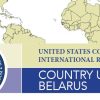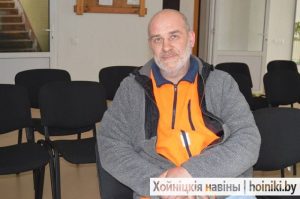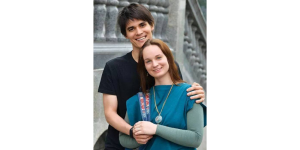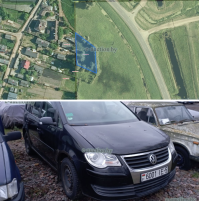Religious Freedom in Belarus in 2021
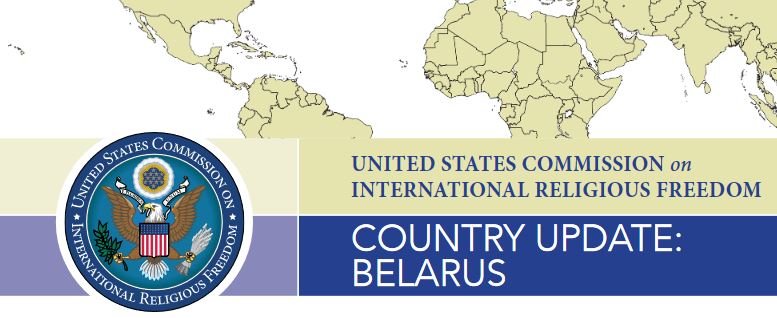
November 2021
Overview
Since August 2020, the Eastern European nation of Belarus has witnessed profound social and political upheaval amidst the government’s authoritarian crackdown that has gutted civil society with devastating consequences for human rights, including religious freedom. The nation of roughly 9.4 million citizens declared independence from the Soviet Union on December 25, 1991, and has been ruled since 1994 by authoritarian President Alexander Lukashenko.
Since then, Lukashenko has steadily consolidated his power, allegedly fixing an electoral process he has subsequently won five times, while appeasing society with some economic reforms that enabled the growth of the middle class and allowed for limited civic freedoms. USCIRF has monitored Belarus since 2004, noting a deterioration in religious freedom following the passage of a restrictive religion law in 2002.
The country’s 2002 religion law mandates official registration for religious practice and is designed to privilege established ‘traditional’ religions and make it difficult for other religious movements to establish themselves in Belarus. The law bears numerous similarities to religion laws in other post-Soviet countries, including several that USCIRF recommends for Country of Particular Concern (CPC) status. At the same time, Belarus has typically refrained from strict enforcement, preferring bureaucratic obstruction and administrative harassment to overt action against religious groups and has therefore avoided CPC status or inclusion on the Special Watch List (SWL).
This dynamic shifted dramatically following August 9, 2020, when Lukashenko claimed to win reelection despite significant evidence that he lost to the 37-year-old opposition candidate, Sviatlana Tsikhanouskaya, prompting widespread popular protests. The government’s response has been exceptionally brutal, increasing its use of repressive mechanisms to maintain power, including those that systematically violate the freedom of religion or belief. As an integral part of Belarusian civil society, religious organizations have not been exempt from this government crackdown. In contemporary Belarus, independence is no longer tolerated and all institutions, including religious ones, are perceived as a threat to the regime unless they actively support it.
This country update provides an overview of religious freedom conditions in Belarus since 2020, providing background on the Lukashenko regime and the country’s 2002 religion law before turning to the 2020 elections, popular protests, and the regime crackdown. It then discusses the government’s targeting of the Catholic and Belarusian Orthodox Churches, as well as issues for other religious minorities. The report concludes with a brief summary of U.S. policy toward Belarus and anticipates future discussions about the deterioration of religious freedom under Lukashenko.
Background
The first and only independent president of Belarus, Lukashenko began his career as a political officer in the Soviet Red Army before rising through the ranks of the communist bureaucracy, eventually becoming the only deputy in the Supreme Soviet of the Belarusian Soviet Socialist Republic to vote against the dissolution of the Soviet Union in 1991. Shortly after he was elected president in relatively free and fair elections in 1994, Lukashenko pushed through a new constitution that weakened the role of the legislature and granted sweeping powers to the president, including the right to extend his term in office, rule by decree, and appoint one-third of the upper chamber of parliament.
Lukashenko has increasingly portrayed domestic opposition to his rule as an American plot, echoing Russian narratives about supposed U.S. government plans to turn former Soviet countries like Ukraine and Georgia into proxy governments. This marks a shift for Lukashenko who, despite close economic and cultural ties with Russia, was just as likely to accuse Vladimir Putin’s government of similar plots prior to August 2020. Indeed, just one month prior to the election, Lukashenko accused the same domestic opposition of being controlled by Russian puppet masters. On July 31, 2020, Belarus arrested 33 Russian individuals it claimed were mercenaries sent to disrupt the election.
2002 Religion Law
Belarus’ religion law established three tiers of registered religious groups: religious communities, religious associations, and national religious associations. Religious communities must include at least 20 persons over the age of 18. Religious associations must include at least ten communities, one of which must have been active in the country for at least 20 years and may be constituted only by a national-level religious association.
All religious groups must obtain permits to hold activities outside of their premises, including proselytizing, and are required to pay exorbitant fees for police protection and other costs. Since 2019, individuals can be fined up to five weeks’ average wage for unauthorized religious activity, and police officers can give fines without any court hearing. The law does not allow private religious primary or secondary schools or homeschooling for religious reasons, and only the Belarusian Orthodox Church is allowed to participate in public education.
Popular Protests and Regime Crackdown
Although far from the first election with reported irregularities and fraud, Lukashenko’s outlandish claim to more than 80 percent of the vote provoked widespread popular outrage, spurring a massive, prolonged protest movement that drew hundreds of thousands to the streets across Belarus for months. Belarusian authorities arrested more than 30,500 Belarusian citizens in connection with the protests, subjecting many to torture, inhumane prison conditions, and long arbitrary sentences for alleged “extremism” and “terrorism.” The exact number of current political prisoners is unknown, with counts ranging from 847 to 1033 and many more suspected.
The government has employed extreme measures to decimate the country’s fragile civil society, including the forced landing of a Ryanair flight that passed through Belarusian airspace on its way from Athens, Greece to Vilnius, Lithuania to capture a young journalist critical of the regime. Journalists at Tut.by, once the largest independent news outlet in Belarus, currently face up to 12 years in prison for allegedly inciting “hatred or discord.” Hundreds of Telegram channels, including Tsikhanouskaya’s, have been banned as ‘extremist,’ and individuals can face prison just for subscribing to them. On October 5, 2021, the last legal human rights organization in Belarus was liquidated.
The Roman Catholic Church
On August 31, 2020, Belarus blocked Belarusian Catholic Archbishop Tadeusz Kondrusiewicz from reentering the country after a short trip to Poland in retaliation for speaking out against the regime’s violence against protestors. A few weeks later, authorities annulled Kondrusiewicz’s passport, despite his being a Belarusian citizen. Following intense international pressure they eventually readmitted him to the country on Christmas Eve, but the Archbishop ultimately resigned in January 2021.
Tensions between the government and the Catholic Church are longstanding and were only exacerbated by the popular unrest. Since the protests started on August 9, demonstrators rallied at an iconic Catholic Cathedral known as the “Red Church” in the capitol of Minsk. On August 23, the state-controlled Radio Belarus unexpectedly stopped its regular broadcasting of Catholic Mass on Sundays. When riot police violently broke up a protest on August 26, some participants fled into the church for protection. Authorities clearly perceived a link between protestors and religion, evidenced by reports of police beating cross-shaped bruises on the backs of protestors or forcing detainees to pray during torture. Both Catholic and Orthodox prisoners reportedly have been denied visits from clergy and refused access to religious materials.
The Catholic Church actively supported opposition to the Lukashenko regime even prior to the elections. Lukashenko, who sometimes refers to himself as an “Orthodox atheist,” is generally suspicious of religion, but particularly of Catholicism, which is the second largest faith in the country, professed by around 12 to 15 percent of the population. The government understates the level of religiosity in the country, claiming that only 60 percent of the country is religious, but independent polling by the Pew Research Center demonstrated higher levels of religiosity, with only 3 percent of respondents claiming to be atheist or non-observant.
For years, the government has made a concerted effort to diminish Catholic influence by making it difficult for foreign priests to obtain residence and by ejecting long-serving clerics from the country. Although the church is also popular with ethnic Poles and Lithuanians, most Catholics in the country are ethnically Belarusian. However, a relative lack of Catholic training facilities in Belarus means that nearly half of the Catholic clergy are foreign citizens, mostly from Poland, which reinforces the government narrative that Catholics are a hostile foreign element. Lukashenko claims to have raised the issue with the Pope, and wants Belarus to “train its Catholic clergy more intensively,” which inevitably raises the specter of increased government interference in the church.
All foreign clergy must obtain official permission to serve in the country, the permits for which range from three months to a maximum of one year. They must constantly reapply and can be denied without explanation, which happens frequently in the case of Polish Catholic priests. In September 2020, the authorities deported a long-serving Catholic priest without explanation and have since harassed, fined, and detained many others. According to Father Vyacheslav Borok, who fled the country in July 2021 after facing criminal charges, “The Catholic Church is ready for repression and many bishops are simply prepared to go to prison.”
Government repression is not limited to Catholic leadership. Although most religious properties were returned to their congregations after the collapse of the Soviet Union, the Belarusian government still maintains ownership of the “Red Church,” and the congregation must pay more than 5,000 USD per month to rent the building. In July 2020, prior to the unrest, the government informed the congregation that it owed an additional 166,000 rubles (roughly 68,000 USD) for renovations it did not request. By January 2021, the government declared that the debt had now risen to 350,000 rubles (or roughly 140,000 USD). The Church’s chief accountant reported that the government is unwilling to speak with them about it and that the congregation feels as if the regime has declared “war” on them. “We do not know what they want from us,” the chief accountant stated.
On the July 3 holiday commemorating the liberation of Minsk from the Nazis, the government required a pro-regime prayer in all Catholic, Orthodox, Jewish, and Muslim facilities. On the same day, Lukashenko gave a speech that threatened punitive action against the Catholic Church if they sang the hymn Mahutny Bozha (Mighty God), which is popular at protests and was once proposed as the country’s national anthem. When the congregation at Minsk’s main cathedral, Church of the Virgin Mary, sang the song at a mass on July 4, police raided the service. In September 2021, a state newspaper published an anti-Catholic cartoon in which priests singing Mahutny Bozha carry a cross shaped like a swastika.
The Belarusian Orthodox Church
The Catholic Church is not the only target of regime repression, which extends even to historically privileged faiths like the Belarusian Orthodox Church (BOC). The BOC is ultimately subordinate to the Russian Orthodox Church Moscow Patriarchate (ROC-MP), with whom it maintains deep historical ties, and is officially acknowledged as an essential part of the national heritage. It is allowed special influence in spheres like education and healthcare.
Nevertheless, the BOC has traditionally maintained a level of independence from the state that is no longer tolerated under present conditions. In the past, the BOC joined forces with Catholics and Protestants to demand a review of Belarus’ 2002 Religion Law. Since August 2020, BOC clergy have also spoken out against the rigged election and government violence with similar consequences.
In the immediate aftermath of the August 2020 election, the ROC-MP leader, Patriarch Kirill, congratulated Lukashenko on his victory and spoke of the need for continued cooperation between Belarus and Russia, as well as the ‘patriotic education’ of younger generations. BOC clergy were less enthusiastic. When Metropolitan Pavel, the head of the BOC, visited wounded protestors in the hospital in August and spoke out against regime violence, the church leadership in Moscow immediately removed him.
On November 27, 2020, the Belarusian government issued a written warning to the BOC leadership that threatened, among other things, to remove the church’s legal status if it did not actively remove clergy who threatened the constitutional order of the country. The official BOC spokesman, to whom the letter was addressed, promptly resigned his position.
Since that time, the government has pressured church leadership to remove from service numerous BOC clergy for supporting the protests. During the summer of 2021, the BOC leadership reportedly provided the government with a list of more than 100 priests that it considered disloyal to the regime. On June 9, 2021, the church leadership in Moscow removed Archbishop Artemy, a popular cleric, affectionately referred to as “the conscience of the Belarusian Church,” who refused to stop his public condemnation of regime violence. More than 1,000 Belarusian Orthodox believers signed a letter to Metropolitan Kirill and the leadership of the ROC-MP requesting they reverse the decision, and lamenting the politicization of religion that threatened to “destroy trust in the church among society.” Artemy subsequently claimed in an interview that the Belarusian government ordered his removal.
In recent months, Belarusian and Russian government officials have attempted to characterize these tensions as the result of an international conspiracy. On July 25, 2021, Lukashenko claimed that Belarus was engaged in a “global confrontation” that represented nothing less than “an attempt to destroy Orthodoxy in Belarus.” Similarly, on September 10, 2021, Russian Foreign Minister Sergei Lavrov announced that the United States was “trying to establish an autocephalous uncanonical church in Belarus” like the Ukrainian Orthodox Church, which was granted independence from the ROC-MP by Ecumenical Patriarch Constantinople Bartholomew I in 2019.
Antisemitism
Government-promoted conspiracy theories also include those driven by antisemitism. On the same day Lukashenko warned Catholics not to sing Mahutny Bozha, he spoke of a “Holocaust of the Belarusian people” during World War II that is largely ignored because the “Jews succeeded in causing the entire world to kneel to them.”
Such antisemitic sentiments are common among authorities in Belarus, which had one of the largest Jewish populations in Europe prior to the Holocaust. In August 2020, as the anti-government protests commenced, law enforcement abducted a young Israeli tourist visiting his extended family in Belarus as part of a historical roots tour and tortured him in custody. When the police found out he was Israeli, they berated him with antisemitic insults and threatened to give him “another circumcision.”
On September 28, 2021, Belarusian security services shot and killed a young political dissident named Andrei Zeltser during a raid on his apartment in Minsk. After a Russian outlet claimed Zeltser was Jewish, Belarusian state television aired an antisemitic diatribe in which the commentator spoke in a mock Jewish accent and called Zeltser a “cosmopolitan, enjoying state benefits to fatten himself up and live in two countries, to make money here and spend it there.”
Religious Minorities
The government also targets religious minorities. On February 17, 2021, police cut through the lock on the New Life Pentecostal Church and forcibly evicted around 70 worshippers engaged in prayer. The church has owned the building since 2002, but the government refuses to rezone the building and recognize it as a house of worship, despite the congregation’s extensive renovations. The congregation currently holds their worship services and other meetings in the parking lot and has been threatened with further punitive action.
In July 2021, the government liquidated 50 non-governmental organizations, including a Hare-Krishna cultural organization and two Protestant charities.
U.S.-Belarus Relations
The United States has long-standing diplomatic tensions with Belarus related to Lukashenko’s authoritarian policies. After the 2006 presidential election in Belarus, which was similarly marred by irregularities, the United States imposed travel restrictions and targeted sanctions against nine state-owned entities and 16 individuals, including Lukashenko. In 2008, U.S. sanctions were tightened in response to ongoing human rights abuses, resulting in Belarus expelling the U.S. ambassador and most embassy staff. Ambassador Julie Fisher was confirmed on December 15, 2020, as the first U.S. Ambassador to Belarus since 2008.
In December 2020, the U.S. government sanctioned four state entities and 40 individuals for their role in the August election fraud. For the one-year anniversary of the election on August 9, 2021, the U.S. enacted further sanctions against 23 individuals and 21 entities who “are involved in the continuing violent crackdown on peaceful protests; are connected to the May 23, 2021, Ryanair incident; or, profit from or sustain the Belarusian regime at the expense of the Belarusian people.”
Conclusion
It is likely that Belarus and Russia will continue to grow closer, with Lukashenko sacrificing his cherished independence from Moscow to remain in power. This does not bode well for religious freedom in Belarus, which will only decline as Russian influence rises. The crackdown on Belarusian civil society has dramatically impacted religious groups across the spectrum, including even the largest group, the Belarusian Orthodox Church.
As U.S. policymakers seek to address major human rights violations in Belarus, they should recognize how the Belarusian government is using severe religious persecution as a strategy of repression against its citizens and incorporate this understanding into U.S. policy toward the country.


